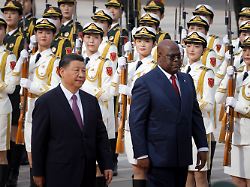Geostrategic priority
Germany should use its opportunity in the Congo
A guest article by Jakob Kerstan
December 17, 2023, 1:55 p.m
China is by far the Democratic Republic of Congo’s largest trading partner, but skepticism towards the People’s Republic is growing. If President Tshisekedis is confirmed in office, it will be an opportunity for Germany and Europe.
A huge building complex is currently growing in the heart of the Congolese capital Kinshasa: The People’s Republic of China is building a new embassy that will surpass all other country representations in the resource-rich country. However, the Democratic Republic of Congo’s main trading partner is clearly feeling headwinds under current President Félix Tshisekedi: he is having the bilateral contracts renegotiated. On December 20th, the country of 100 million people will elect a new president. This can be an opportunity for Germany.
70 percent of the cobalt mined worldwide comes from the Central African country. Beijing is the main buyer of this raw material, which has so far been irreplaceable for the energy transition. Coltan, copper and lithium, which are also abundant in the DR Congo, will also play a crucial role in implementing the energy and mobility transition. In addition to the immense reserves of raw materials, the country is home to the second largest contiguous area of rainforest in the world. The importance of Congo for the green transformation is unique in the world.
China has recognized the potential and is the largest investor in the Congolese mining sector; 15 of the 17 cobalt mines in Congo are (partly) financed by the People’s Republic. 80 percent of all Congolese raw materials find their way to China for further processing. In 2022, the combined trading volume was $21.9 billion. For comparison: Germany comes to 223 million US dollars.
Partnership with China is viewed more and more critically
The basis of the partnership between China and the Congo is the so-called “Treaty of the Century” from 2008. China, hungry for raw materials, was guaranteed extensive production concessions. In return, the People’s Republic committed itself to extensive infrastructure expansion. However, only a fraction of the promised $9 billion in investments in the desolate Congolese infrastructure has so far been invested. The government speaks of exploitation and is having the contracts renegotiated.
Despite his economic dependence on China, Tshisekedi, who lived in Belgium for a long time, is not a natural partner for the People’s Republic. He is much more skeptical about it than his predecessor Joseph Kabila. The partnership is now also being questioned more and more critically by the civilian population, among other things because Chinese companies often disregard the requirements of the Congolese government with their extremely aggressive raw materials policy.
Other new partners are also involved in the Congo. The United Arab Emirates is currently building the country’s first deep-sea port. During his state visit in 2022, Turkish President Tayyip Recep Erdoğan promised to build a gigantic financial center in Kinshasa, which is now nearing completion.
Rapprochement in the interest of Europe
The non-transparent economic structure in the DR Congo plays into the hands of countries like China. However, due to complex compliance rules, a lack of political will and well-intentioned but difficult to implement legal requirements, such as the Supply Chain Act, market access is additionally challenging for European companies. Nevertheless, due to its key role in climate policy, the DR Congo should also become a geostrategic priority in the eyes of Western states.
It is therefore in the strategic interest of Germany and Europe to expand relations with difficult, but essentially pro-Western, governments and to face global competition locally. This is the only way to reduce dependence on China for critical raw materials. Expanded government export guarantees would be beneficial for the sustainable settlement of German companies, especially for high-risk countries with their weak institutions. The DR Congo’s participation in the Compact With Africa initiative at the end of November this year is therefore a real attempt at rapprochement.
For Europe, a second term in office for Tshisekedi could not only mean political stability in the largest country in sub-Saharan Africa, but would also ensure a potentially close partner in global competition with China. Despite all the difficulties and domestic political challenges, a government is standing for re-election that is significantly closer to the West on global political issues than numerous other countries on the African continent.
In the current Congolese election campaign, ideological differences are hardly important. The chairmen of over 900 parties primarily attract attention through their populist slurs and criticism of the electoral commission. As long as the biggest logistical hurdles that have yet to be resolved are cleared, the (new) president will be inaugurated into office on January 20th. Main challenger Moïse Katumbi is only significantly more popular than the incumbent in Katanga, his home region. There is therefore hardly anything standing in the way of Tshisekedi’s election victory. An opportunity for Germany and Europe to gain influence in the future.
The author: Jakob Kerstan, who studied political science and economics, has been heading the Konrad Adenauer Foundation’s foreign office in the Democratic Republic of the Congo since 2021.
